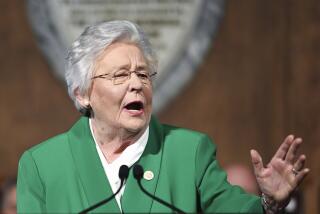UAW gives ground to aid Big 3’s chance for bailout
WASHINGTON — First it was the heads of Detroit’s Big Three automakers who offered public pledges to cut costs, shrink their vehicle lines, go green and slash their own salaries in the quest for a desperately needed government bailout.
On Wednesday, it was the workers’ turn to sacrifice before crucial congressional hearings begin this morning on the automakers’ request for $34 billion in emergency loans.
United Auto Workers President Ron Gettelfinger said the union would allow General Motors Corp., Ford Motor Co. and Chrysler to delay billions of dollars in payments to a retiree healthcare trust and suspend a controversial jobs bank that pays laid-off workers. The union also would consider other cost-cutting changes, he said.
But Gettelfinger complained that, after workers agreed to major concessions in 2005 and 2007, the union and the companies were being asked to make significant new sacrifices in order to secure federal aid, while big financial institutions such as Citigroup gave up relatively little to secure much larger amounts of taxpayer money.
“Are we going to blame the autoworkers, who are by the way 10% of the cost of an automobile . . . or are we going to take a look at what’s happened to our economy, to the housing crunch, to the Wall Street bailout and the failures on Wall Street,” Gettelfinger said during a televised Detroit news conference as union members cheered.
“I’m having a little problem myself here understanding why there’s a double-standard here, but we accept it and we’ll play by those rules,” he said.
The union’s announcement came one day after GM said it faced insolvency by the end of the year without $4 billion in immediate federal aid, with billions more needed in 2009. Chrysler said it needed $7 billion or could run out of cash early next year. And Ford, which requested a “stand-by line of credit” of as much as $9 billion, warned that a failure by one of its U.S. competitors could take the others with it.
Rep. Fred Upton (R-Mich.), co-chairman of the House Auto Caucus, said the union moves should help sway skeptical lawmakers. “Everyone’s got to tighten their belt, that includes the UAW as well as management,” he said.
The Big Three chief executives did so poorly in requesting federal help last month that Democratic congressional leaders told them to deliver detailed turnaround plans this week and gave them a second chance to plead their case.
GM chief Rick Wagoner arrived in Washington on Wednesday -- this time in a fuel-efficient Chevy Malibu hybrid after he and others were roundly criticized for jetting in last month on separate private planes. Ford CEO Alan Mulally and Robert Nardelli, Chrysler’s top executive, also drove to Washington in hybrids from their companies.
The public relations offensive continues this morning when GM, Ford and Chrysler, along with Sen. Carl Levin (D-Mich.), plan to show off the companies’ advanced technology vehicles on Capitol Hill before the hearing.
The automakers face a tough sales job. A CNN/Opinion Research Poll released Wednesday found that 61% of Americans oppose a bailout.
But the UAW is a major supporter of Democrats and helped President-elect Barack Obama win such key Midwestern states as Michigan and Ohio, so party leaders don’t want to let one or more of the automakers fail, said Ross Baker, a political science professor at Rutgers University.
“The fact that they have given the heads of the automobile companies a make-up exam is an indication that they regard the support of unions as crucial, and they don’t want to desert a friend,” he said.
Opponents of bailing out the automakers have pointed to the union contracts, arguing that generous pay and benefits have kept GM, Ford and Chrysler from being more competitive with foreign automakers. The companies and the UAW said major concessions in 2007 would eliminate most of the cost differences by 2010.
The UAW sent fact sheets this week to every member of Congress disputing some claims about its wages and benefits, such as an oft-cited figure that union autoworkers earn $73 an hour. That figure includes pension and healthcare costs for both current and retired workers. UAW members now earn $14 to $33 an hour, the union said.
But Gettelfinger, who will testify today alongside the CEOs before the Senate Banking Committee, said offering more givebacks was the responsible thing to do.
Last year’s contract talks led to the creation of the Voluntary Employee Beneficiary Assn. trust, a concession aimed at lowering costs for retiree healthcare. Payments to the trust are supposed to start in 2010, and automakers targeted the fund in their plans to Congress as a source of additional savings. Ford, for example, is scheduled to pay $13.2 billion into the trust by the end of 2009.
The jobs bank, which pays laid-off workers, has been controversial, and many analysts predicted the union would have to give it up. The move is largely symbolic because the number of workers paid through the bank has shrunk significantly in recent years to less than 4,500.
But Gettelfinger noted that with a smaller workforce that is earning less as a result of earlier concessions, the union alone couldn’t save the Big Three.
“To be honest with you right now, if the UAW membership went in these facilities and worked for nothing . . . it would not help the companies that much,” he said.
The union workforce at GM, Ford and Chrysler has declined to less than 150,000 from 300,000 five years ago, and the companies are promising more cuts in the restructuring plans they delivered Tuesday to Congress.
A vote on government aid could come next week. But a showdown looms with President Bush.
Congressional Democratic leaders want aid for the automakers to come from the $700-billion Troubled Assets Relief Program. But the Bush administration wants to divert money from an existing $25-billion loan fund designed to help U.S. automakers retool their factories to produce more fuel-efficient vehicles.
The automakers increased their bailout request to $34 billion this week, which would make the loan fund inadequate. White House spokeswoman Dana Perino on Wednesday didn’t rule out finding additional money but said officials wanted to review the plans and see what Congress did first.
Although there is bipartisan legislation to divert the existing loan money, House Speaker Nancy Pelosi (D-San Francisco) opposes the move. Obama declined to weigh in on the dispute Wednesday, telling reporters, “I’m more interested in seeing whether or not there is a sound plan there. And then I’ll be in discussions and listening about where the best sources of money are.”
But he praised Congress for requesting detailed turnaround plans from the automakers.
“When the Big Three automakers came before them a couple of weeks ago, they were not offering a clear plan for viability over the long term,” Obama said. “And I think Congress was right to say that the taxpayers expect and deserve better than that before they are stepping up to the plate for any kind of bailout.”
--







